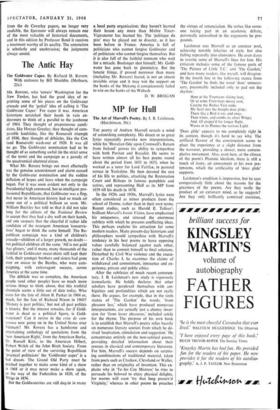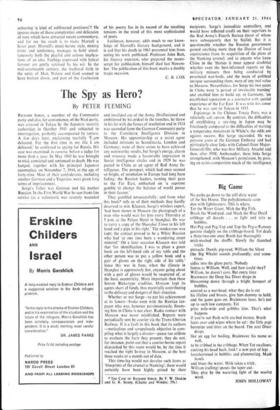MP for Hull
The Art of Marvell's Poetry. By J. B. Leishman. (Hutchinson, 50s.) THE poetry of Andrew Marvell reveals a mind of astonishing complexity. His dozen or so great lyrics repeatedly provoke new interpretations, while his 'Horatian Ode upon Cromwell's Return from Ireland' proves his ability to sympathise with both Puritan and Royalist. He seems to have written almost all his best poems round about the period from 1651 to 1653, when he worked as a tutor for Lord Fairfax, in pastoral retreat in Yorkshire. He then devoted the rest of his life to politics, attacking the Restoration Court and Bishops in famous pamphlets and satires, and representing Hull as its MP from 1659 till his death in 1678.
In the 1920s and 1930s, Marvell's lyrics were often considered as minor products from the school of Donne, rather than in their own terms. Recent studies, such as Harold E. Toliver's brilliant Marvell's Ironic Vision, have emphasised his uniqueness, and stressed the enormous subtlety with which he presents conflicting ideas. This perhaps explains his attraction for some modern readers. Many present-day historians and philosophers would sympathise with Marvell's tendency in his best poems to leave opposing values carefully balanced against each other, rather than to commit himself to final solutions. Disturbed by Civil War violence and the execu- tion of Charles I, he examines the claims of withdrawal and commitment, innocence and ex- perience, private and public ethics.
After the subtleties of much recent commen- tary, J. B. Leishman's new study is vigorously iconoclastic. He boldly declares that other scholars have perplexed themselves with am- biguities and profundities which are not really there. He argues, for example, that in the sixth stanza of 'The Garden' the words, `from pleasure less,' which have produced numerous interpretations, are actually just a clumsy inver- sion for 'from lesser pleasures,' included solely for the rhyme. The purpose of his own book is to establish that Marvell's poetry relies heavily on numerous literary sources from which he de- rived `inspiration, stimulation and suggestion.' He concentrates entirely on the non-satirical poems, providing detailed information about their sources in classical and contemporary literature. For him, Marvell's success depends on surpris- ing combinations of traditional material, taken from poets such as Crashaw, Cleveland or Waller, rather than on originality of invention. This ex- plains why in `To his Coy Mistress' he tries to persuade his beloved to enjoy physical delights, for worms will soon `try that long preserv'd Virginity,' whereas in other poems he preaches the virtues of renunciation. He writes like some- one taking part in an academic debate, personally uninvolved in the arguments he pro- pounds.
Leishman sees Marvell as an amateur poet, achieving notable felicities of style, but also falling repeatedly into clumsiness. He even dares to rewrite some of Marvell's lines for him. His criticism includes some of the famous parts of The Picture of Little T.C.' and `The Garden,' and here many readers, like myself, will disagree. In the fourth line in the following stanza from 'The Garden' he finds the word 'does' unneces- sary, presumably included only to pad out the rhythm: Here at the Fountains sliding foot,
Or at some Fruit-trees mossy root, Casting the Bodies Vest aside, My Soul into the boughs does glide: There like a Bird it sits, and sings.
Then whets, and combs its silver Wings; And, till prepar'd for longer flight.
Waves in its Plumes the various Light.
`Does glide' appears to me completely right in its context, though it's hard to say why. The artificial flavour of the construction seems to place the experience at a slight distance from the narrator, providing a slower, more contem- plative movement. Also, even here, at the climax of the poem's Platonic idealism, there is still a touch of irony, an amusement at his own pre- tensions, which the artificiality of 'does glide' supports.
Leishman's erudition is impressive, but he says comparatively little about the reasons for the greatness of the poems. Are they really the product of an extrovert mind, as he suggests? Are they only brilliantly contrived exercises,
achieving 'a kind of sublimated prettiness'? He ignores many of those complexities and delicacies of tone which have attracted recent commentary, and for me the result is to make Marvell a lesser poet. Marvell's mock-heroic style, mixing irony and tenderness, manages to hold simul- taneously both the playful and serious implica- tions of an idea. Feelings expressed with lyrical fervour are gently satirised by his wit. In the mid-seventeenth century, the medieval faith in the unity of Man, Nature and God seemed to have broken down, and part of the fascination of his poetry lies in its record of the resulting tensions in the mind of this most sophisticated of poets.
Leishman, however, adds much to our know- ledge of Marvell's literary background, and it is sad that his death in 1963 prevented him from seeing his work published. Professor John Butt, his literary executor, who prepared the manu- script for publication, himself died last Novem- ber. The publication of this book marks a doubly tragic occasion.
C. B. COX



































 Previous page
Previous page